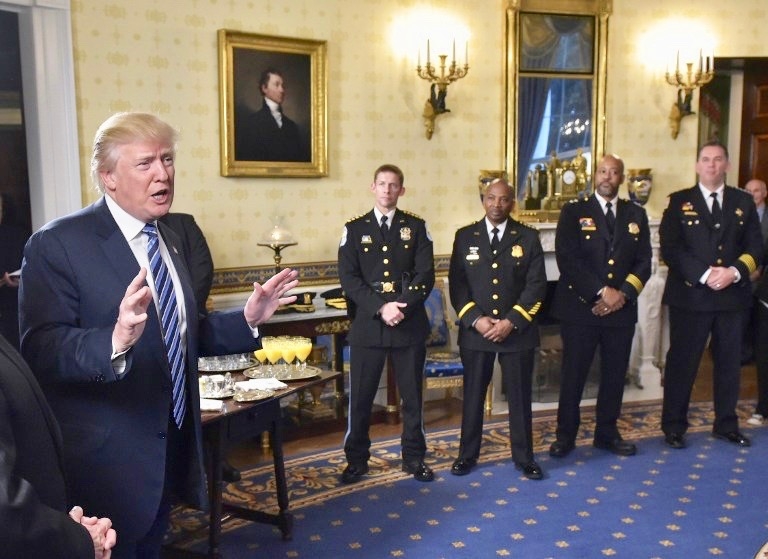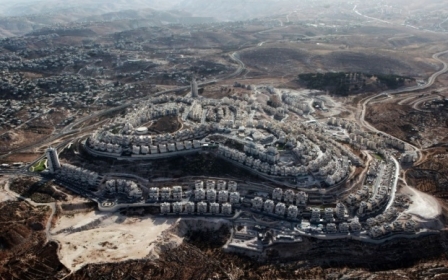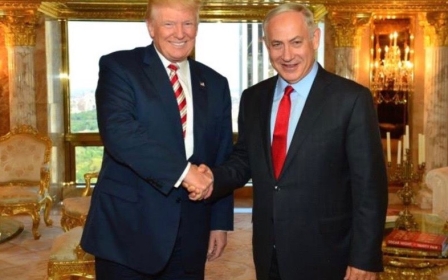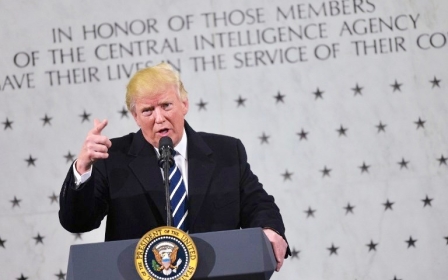Trump, Netanyahu discuss Iran 'threat' and agree February meeting

US President Donald Trump on Sunday invited Israeli Prime Minister Benjamin Netanyahu to visit him in Washington next month, the premier's office said, citing their first conversation since Trump took office.
"President Trump invited Prime Minister Netanyahu to come to Washington to meet him in February," it said in a statement. "A final date for the visit will be set in the days ahead."
Trump told reporters at the White House that his call with Israel's premier was "very nice," and later a White house statement said they discussed threats from Iran and agreed peace between Israel and the Palestinians must be "negotiated directly".
Israel approved hundreds of new settler homes in East Jerusalem on Sunday, hours before the telephone call, which the statement described as "very warm". But a plan to annex a large West Bank Jewish settlement unilaterally was shelved until after Netanyahu and Trump meet.
"The two leaders discussed the nuclear deal with Iran, the peace process with the Palestinians and other issues," Netanyahu's office said.
"The Prime Minister expressed his desire to work closely with President Trump to forge a common vision to advance peace and security in the region," it said.
Trump has pledged strong support for Israel and vowed during his campaign to recognise Jerusalem as the country's capital despite the city's contested status.
But the White House on Sunday appeared to play down suggestions that relocating the American embassy from Tel Aviv to Jerusalem was imminent.
"We are at the very beginning stages of even discussing this subject," White House press secretary Sean Spicer told AFP.
Like other major powers, the US maintains its embassy in Tel Aviv pending a resolution to the Israeli-Palestinian conflict and Jerusalem's status.
Israel captured Arab East Jerusalem during the 1967 war and later annexed it - in a move not recognised by the international community - declaring all of the city its unified capital.
The Palestinians claim East Jerusalem as the capital of their future state.
The US is Israel's most important ally, providing it with more than $3bn per year in defence aid, but former President Barack Obama grew frustrated with Israeli settlement building.
He declined to veto a 23 December UN Security Council resolution condemning settlements. Trump had called for the resolution to be vetoed.
In an initial move following Trump's inauguration, Israeli officials on Sunday approved building permits for 566 settler homes in annexed East Jerusalem.
Haaretz reported that Netanyahu had informed members of the inner security cabinet on Sunday that he has decided to lift all restrictions on Israeli construction in East Jerusalem resulting from international diplomatic pressures, two senior officials who have been briefed on what transpired at the meeting said.
"The rules of the game have changed with Donald Trump's arrival as president," Jerusalem Deputy Mayor Meir Turjeman told AFP.
"We no longer have our hands tied as in the time of Barack Obama. Now we can finally build."
The Palestinian presidency condemned the move, calling it a violation of the UN resolution.
A draft bill to annex the Maale Adumim settlement in the occupied West Bank had been on the agenda for approval by a ministerial committee legislation on Sunday.
Such a move could badly damage prospects for a two-state solution.
But the inner circle of senior ministers known as the security cabinet blocked it for the time being, a member said.
"What was decided was to wait for the meeting which will certainly take place within a few weeks," Energy Minister Yuval Steinitz told Israeli public radio.
Annexing Maale Adumim unilaterally would set off alarm bells globally, with many warning that it would be another step towards dividing the occupied West Bank between north and south, making a contiguous Palestinian state difficult to achieve.
For some Israeli ministers who oppose a Palestinian state, that is precisely the point.
"We have to tell the American administration what we want and not wait for orders from the administration," Justice Minister Ayelet Shaked told Israel's army radio.
Maale Adumim, in a strategic location East of Jerusalem, has some 37,000 residents.
Some peace proposals have envisioned it becoming part of Israel in land swaps agreed with the Palestinians, but not unilaterally.
"Given Maale Adumim's critical location in the heart of the West Bank, the international community has for years been following with special concern all developments in this area, seen as a touchstone for the viability of a two-state solution," settlements watchdog Ir Amim said.
Israel occupied the West Bank, like East Jerusalem, in 1967.
Settlements in both the West Bank and East Jerusalem are viewed as illegal under international law.
Some 400,000 Israeli settlers live in the West Bank, with another 200,000 in East Jerusalem. In comparison, about 2.9 million Palestinians live in the West Bank and East Jerusalem.
Middle East Eye propose une couverture et une analyse indépendantes et incomparables du Moyen-Orient, de l’Afrique du Nord et d’autres régions du monde. Pour en savoir plus sur la reprise de ce contenu et les frais qui s’appliquent, veuillez remplir ce formulaire [en anglais]. Pour en savoir plus sur MEE, cliquez ici [en anglais].




